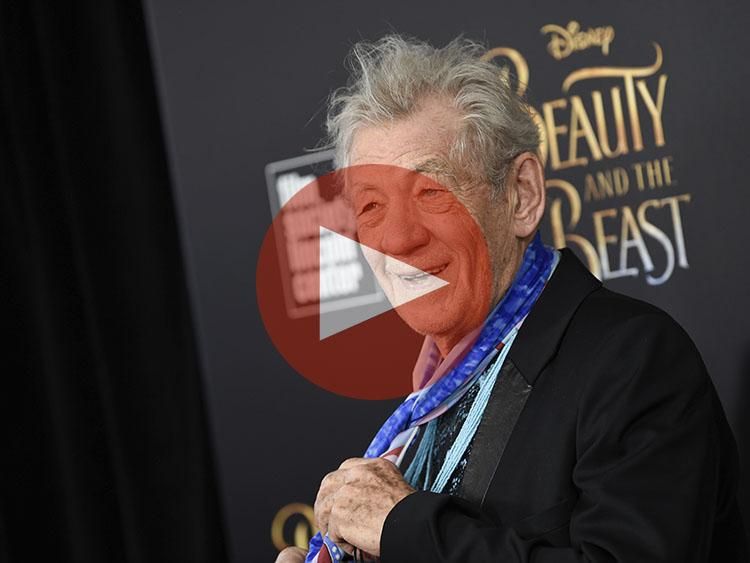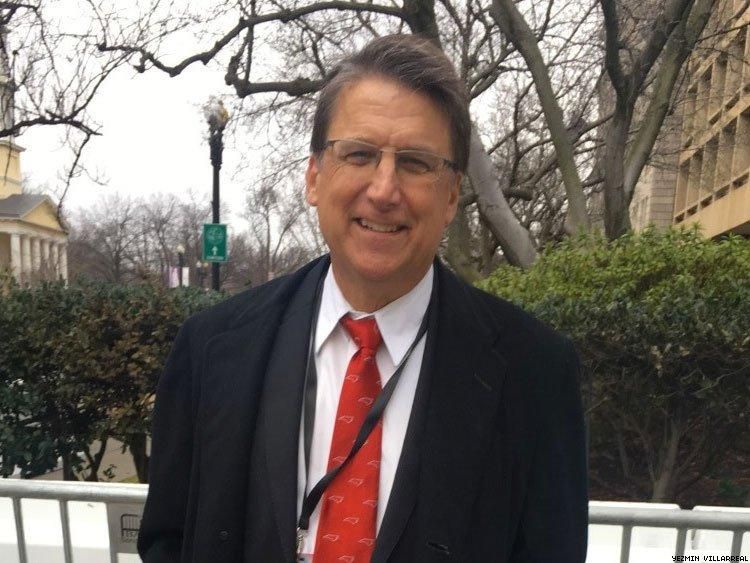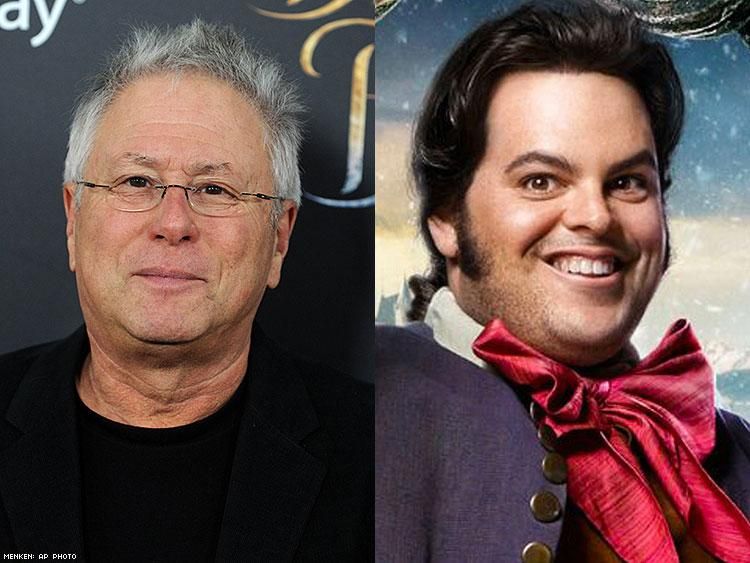Sir Ian McKellen Calls 'Beauty and the Beast' Gay Controversy 'Rubbish' (Video)

The legendary out actor commented on the sexual orientation of the character LeFou, and the lack of gay characters in general: “Why should they be excluded?”
Sir Ian McKellen Calls 'Beauty and the Beast' Gay Controversy 'Rubbish' (Video)

The legendary out actor commented on the sexual orientation of the character LeFou, and the lack of gay characters in general: “Why should they be excluded?”
Rachel Maddow has Trump’s Tax Returns, and will air them tonight. Seriously.

Rachel Maddow has been doing some truly exemplary reporting since Donald Trump took office, often moving past the rhetoric and examining the nuts and bolts of what is really being done behind the scenes.
And today at around 7:30pm eastern time, she Tweeted the tease of the century ahead of her 9 p.m. broadcast:
BREAKING: We’ve got Trump tax returns. Tonight, 9pm ET. MSNBC.
(Seriously).
— Rachel Maddow MSNBC (@maddow) March 14, 2017
Trump’s tax returns have been something of a holy grail throughout the long election cycle, especially when he refused to share them last November. It was an unprecedented move, which at best tried to hide the fact that he hadn’t paid federal taxes for something like 18 years, and at worst could reveal global business dealings that present all sorts of conflicts of interest.
Maddow has been experiencing a massive ratings spike, outrating every other primetime show last week.
We have a feeling that trend will continue tonight.
Tune in soon if you want to see this horror show play out in real time — 9 p.m. eastern time on MSNBC.
Here’s Hillary Clinton postulating why Trump wouldn’t release his returns:
Pat McCrory Can’t Find a Job

The anti-LGBT former governor of North Carolina says HB 2 is making it difficult for him to find a job.
www.advocate.com/politics/2017/3/14/pat-mccrory-cant-find-job
Joe Biden loves all these Obama bromance memes, but one is his favorite

Remember when political memes involved things like “Hillary’s texts” and “Biden/Obama bromance”?
Oh, how times have changed.
Related: Who’s hotter? Young Justin Trudeau or Young Joe Biden?
Now we have memes about nefarious microwaves, the abysmal replacement of Obamacare, more wire tapping paranoia, and then of course there’s #FreeMelania.
It turns out former Vice President Biden was watching. When his bromance reached meme status, he even “sat there for an hour and laughed,” according to daughter Ashley.
In a recent interview with Vanity Fair, Biden chose this as his very favorite of the batch, and we can see why:
“See? Doesn’t this feel right?”
“Joe I’m not leaving my wife for you.”
“You said we’d be together forev-“
“8 years. I said 8 years.” pic.twitter.com/C2PoAXCD00— Ol’ QWERTY Bastard (@TheDiLLon1) October 17, 2016
But he has a special place in his heart for all these bromantic explorations.
“They’ll go for long walks, looking into each other’s eyes,” former First Lady Michelle Obama joked.
Jill Biden also admired their relationship. “They’re going to be eating ice cream together somewhere, I’m sure.”
Related: Joe Biden Is Really, Really Happy About Marriage Equality
“And I don’t think we’ve really seen a lot of that, especially in politics. But I think they really love one another.”
Well isn’t that adorable (and also pretty bitter-sweet).
Here are some of the quality runner ups:



















Alan Menken Says LeFou Isn't Gay

The Beauty and the Beast composer blamed a reporter from a gay magazine for pushing an “agenda.”
www.advocate.com/film/2017/3/14/alan-menken-says-lefou-isnt-gay
D7K_4645_ep
Eric.Parker posted a photo:
Dyke March. Toronto, July 2, 2016.
Only the street shots – thestreetzine.blogspot.com/
Katya and Trixie Mattel get real about life after ‘Drag Race’

They may not have snatched the crown, but these “RuPaul’s Drag Race” stars are laughing all the way to stardom.
Fan favorites, Trixie Mattel and Katya Zamolodchikova stopped by the gayest show on the internet, Jonny McGovern’s Hey Qween, to spill all the tea on their lives as drag’s most successful losers.
“The real ‘Race’ starts when the show’s over…It doesn’t matter if you don’t win,” said Mattel, explaining the recipe to their success. It’s impossible to deny that these queens have made an impact, beyond the realms of RuPaul’s Emmy award winning show. With their strange, but undeniably hilarious brand of comedy, Trixie and Katya have elevated themselves from reality show contestants to internet superstars.
From their immense social media following to their successful web series, “UNHhhh,” which pulls in hundreds of thousands of views per video, it’s clear that these queens are a force to be reckoned with. Fresh off the set of the “All Stars 2” reunion last year, everyone’s favorite run-of- the-mill Russian bisexual transvestite hooker, Katya, proved once again that being a fan-favorite definitely has its perks.
Related: New season of ‘Hey Qween’ hits the ground running with Alaska
After just 30 days, Katya raised $74,580 on Kickstarter, more than double the amount she had hoped for, to fund a new act she lovingly calls the “Help Me, I’m Dying” tour. As she describes it, the show will be “a fusion of stand-up comedy, story-telling, video, and live dancerly-ish action and music that talks about what it means to be a woman, from the perspective of a person that dresses up like one.”
So when can we expect to see this Russian beauty and her tiny finger hands in full glory? Well according to Katya there’s no set date, but she confirms that it is coming and that she wants to make it perfect.
“It’s all in the works… I wanted the budget to do something great, so if doing something great is going to take a while then it’s going to take a while,” she explained.
And what about Barbie’s prettier, drag queen brother, Trixie Mattel? Well, when she’s not making a surprise cameo in FX’s “American Horror Story” and headlining clubs all around the nation, Trixie’s working hard on her lifelong passion, country music.
If you’ve seen the her old Myspace photos, you know Trixie, real name Brian Firkus, was once a young kid with a guitar and dreams of becoming a singer. “I always wanted to do music, but in case you haven’t noticed there are a million white guys with guitars,” Trixie explains. “So I stopped doing music and started doing drag because it was more lucrative.”
During her “Hey Qween” interview, she revealed that she had just finished recording an album in New York and that she is planning to release it later this year.
Related: Meet RuPaul’s hot rancher boyfriend
According to Trixie, the album will be reminiscent of a Dolly Parton and Porter Wagoner duet album, featuring her male self, Brian, and her drag persona. As for the subject matter of the album, Mattel revealed that she wrote the majority of her album last year after a hard break up.
“All I had was my guitar and a terribly, horribly broken heart so I just wrote music all day,” Trixie explained. “I plan to publicize my breakups and profit from them like other celebrities,” Trixie jokingly added, clearly taking a page from the queen of breakup tracks, Taylor Swift.
Together these queens have cultivated an audience like no other “Ru girl” has before, building up a fan base as supportive as they are ravenous. Whether they’re rambling about nothing on Youtube or lip syncing for their lives on stage, the fans just can’t seem to get enough of their two favorite drag queens.
Watch part one of Trixie and Katya’s interview below and for more fabulous videos head to the Hey Qween Youtube channel:
Stop Complaining about LGBT Characters on TV

Gay people are on TV and many LGBT people are fuming!
Despite years of neglect, decades of caricatures, and lack of attention on LGBT culture, ABC launched the dynamic miniseries, When We Rise, which follows four major characters from the rise of gay liberation to the present, and LOGO just released a trailer of its new reality show, Fire Island, that follows six gay men who share a beach house on the south shore of Long Island, New York.
Criticism of these shows has ranged from indictments of When We Rise as a limited history to claims that Fire Island celebrates the superficiality of gay culture: shirtless bronzed bodies, carefree days on the beach, and anonymous hookups. One recent comment on social media warned gay youth, “Don’t worry, we are not all like this.”
While many young LGBT youth may tune into this program, we should not forget that “Fire Island” is a reality show not a suicide hotline. Leaving aside the fact that some parts of LGBT community might enjoy watching shirtless guys flaunt their bodies, why does every show need to be taken so literally? Have we forgotten that we invented “camp”?
Television is not meant to be a pure representation of reality; it is purposely designed to fictionalize and to entertain. These programs are not documentaries or history books, but rather programs that take advantage of their literary license and play with form, style, and character.
The critics of Fire Island fail to recognize, for example, that this show, like many other reality shows, follows particular plotlines: housemates quarreling, housemates having sex, housemates valuing GTL—gym, tan, laundry—a ritual that Michael “The Situation” Sorrentino coined on the reality show “The Jersey Shore”.
The expectation that LGBT people need to rise above these representations and somehow be only shown in a political march is actually the stereotype, and one that When We Rise addresses but with much more nuance and style.

Telling the story of the movement, we meet Cleve Jones, who was Harvey Milk’s protégé and the creator of the AIDS Quilt. Jones’s life was quite remarkable as an activist who earned his stripes in street protests and evolved into a political strategist who clashed with younger generations of activists. The miniseries reveals a fascinating glimpse of Jones’ life outside of political marches. We witness him coming out, finding refuge in a queer tree house, refusing to accept his father’s plans to convert him; we see him trying to peddle up a San Francisco hill as a courier, we his friends dying of HIV/AIDS, we see him sitting alone in a barely lit room counting out his own meds, and we see him fostering an abandoned, crying infant.
Yet critics dismiss the film as too narrow. One historian wrote, “When one person becomes the lens through which the entire story of LGBT activism is told, we are left with disturbing misrepresentations of queer politics, culture, and life.”
 But “When We Rise” announces itself as a biopic based on a memoir, it does not aim to replace or represent all of LGBT history. Biopics are a particular genre, and are meant to lionize a particular figure from a historical period. Consider Twelve Years A Slave or The Danish Girl that take relatively unknown historical figures and introduce to them to a larger public, or consider how some biopics like Lincoln or Frida tell the story of famous people from the past by focusing on particular aspects of their lives. Criticizing When We Rise for focusing on “one person’s life,” which by the way it actually does not, fails to recognize the genre of this miniseries and assigns unnecessary criticism to a show that defines itself as based on a memoir.
But “When We Rise” announces itself as a biopic based on a memoir, it does not aim to replace or represent all of LGBT history. Biopics are a particular genre, and are meant to lionize a particular figure from a historical period. Consider Twelve Years A Slave or The Danish Girl that take relatively unknown historical figures and introduce to them to a larger public, or consider how some biopics like Lincoln or Frida tell the story of famous people from the past by focusing on particular aspects of their lives. Criticizing When We Rise for focusing on “one person’s life,” which by the way it actually does not, fails to recognize the genre of this miniseries and assigns unnecessary criticism to a show that defines itself as based on a memoir.
Biopics might actually be the best route to get LGBT history on television and in films. When producers and writers pitch shows about LGBT history, they depend on characters to lead the audience through a period. These characters become useful vehicles to connect disparate events and offer a semblance of a narrative arc. History books conversely can do what this critic suggests: they can offer more sustained analyses that capture nuance and offer a panoramic view of the past.

Shameless.
Instead of raising nitpicking questions of historical accuracy, why not consider the history of LGBT people on network television? How does this miniseries represent a change over time? What does it mean in the current political moment, when LGBT rights are under attack, that a major network tells the story of queer activists? What does it also mean that the series was willing to disclose all that infighting and division within the movement and not tell the story of a queer activist as some kind of parable about the past?
What critics of When We Rise and Fire Island don’t realize is the larger point that there is a power and politics in visibility During the 1970s, Craig Rodwell, who was the owner of the first ever gay bookstore in the United States, found hope even in the most damaging representations of LGBT people in LIFE magazine and on the nightly news, because he realized that the silence and erasure of LGBT community was worse. To that point, what is at stake in making hair-splitting, often unsubstantiated critiques in a time when LGBT people still remain marginalized in TV and film?
What critics of these television programs fail to recognize is just how painfully difficult it is to get LGBT people on the screen in the first place. While the academic or even personal reactions to these shows might condemn these representations as narrow or stereotypical, there is a power in visibility. We need networks to continue to invest in LGBT-centered programs and we need to realize how many of these endeavors support LGBT writers, producers, and others in the industry.

Despite the fanfare surrounding Ellen in the 1990s, the more recent representation of queer youth on Glee, and the splattering of other queer people in television and in movies over the last few decades, we are still in the pioneering stage of LGBT people on TV. We, as community, need to recognize that we are still in the beginning stage of LGBT people on TV and be a bit more sympathetic to the broader efforts made by so many LGBT producers, writers, and directors to get television shows that make LGBT people the primary subjects. We may have advanced politically but the viewing public lags behind, especially in a violent era when LGBT people are still targeted in nightclubs and massacred.
Before we lash our criticism to these shows for missing a particular point or for possibly perpetrating a stereotype, think of this: in the late nineteenth century, decades after black emancipation, many black novelists scrambled for a writer who would write a novel that would best represent “the race” and prove the artistic talents of black people. The writers strategized behind the scenes before they decided on who would be the first.
Frances Ellen Watkins Harper took up the challenge and wrote, what was considered in the last decade of the nineteenth-century, the first black novel, Iola Leory in 1892. Many black people would later criticize it; in fact, generations later, scholars would uncover that she was not the first novelist, that there were others who published novels before her. But the point is that the black community, thirty years after the ending of slavery, were still very careful about what they wrote, who wrote it, and how they publicly responded to it.
Roughly the same amount of time has passed after the rise of gay liberation, and I worry that we are not seeing the bigger picture and are just firing off reactive criticisms. What is at stake at making such claims?
I am not suggesting that we silence our criticism and let the few anointed writers speak for the rest of us, but rather understand the political implication of our criticism. If a film or book or a TV show egregiously misrepresents the past or capitalizes on a stereotype, we need to speak out against that but that does not mean that every minor detail that does not measure up to our own views is grounds for indictment. We need to situate these critiques within the broader context of the overwhelming silence of LGBT people on TV and the erasure of LGBT history.
The publishing, television and film industries are already reluctant to invest in queer themed programs, books, and movies, we don’t need to give them another reason to reject our stories. Understand that we are in a fragile state. We can criticize behind close doors and poke fun of some these representations with our friends in our living rooms, but remember there is an industry listening to you, that’s looking for a reason to stop putting LGBT people on television.
The history of LGBT community on TV only proves that most networks would prefer to keep LGBT people in the closet.
Jim Downs is the author of Stand By Me: The Forgotten History of Gay Liberation (Basic Books, 2016) and is an associate professor of history at Connecticut College.
The opinions expressed are those of the author.
The post Stop Complaining about LGBT Characters on TV appeared first on Towleroad.
Women Who Paved the Way: Actress and Politician Nancy Kulp

To mark Women’s History Month, The Advocate will feature a different queer woman from history each day. Today we look at Nancy Kulp, most famous for her role as Miss Jane Hathaway on The Beverly Hillbillies.
www.advocate.com/women/2017/3/14/women-who-paved-way-actress-and-politician-nancy-kulp